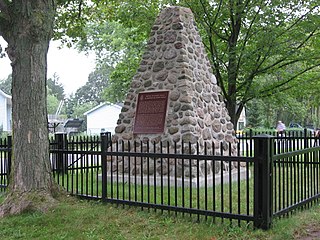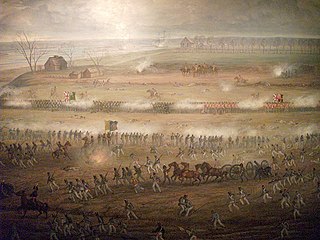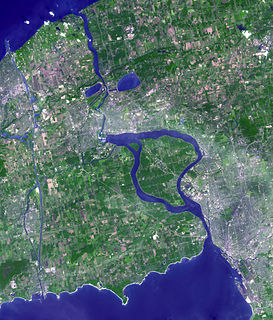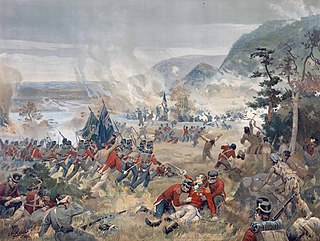 W
WThe Battle of Beaver Dams took place on 24 June, 1813, during the War of 1812. A United States column marched from Fort George and attempted to surprise a British outpost at Beaver Dams, billeting themselves overnight in the village of Queenston, Ontario. Laura Secord, a resident of Queenston, had earlier learned of the U.S. plans, and had struck out on a long and difficult trek to warn the British at Decou's stone house near present-day Brock University. When the U.S. resumed its march, they were ambushed by Native warriors, and eventually surrendered to a small British detachment led by Lieutenant James FitzGibbon. About 500 U.S. soldiers, including their wounded commander, were taken prisoner.
 W
WThe Battle of Chippawa was a victory for the United States Army in the War of 1812, during its invasion on July 5, 1814 of the British Empire's colony of Upper Canada along the Niagara River. This battle and the subsequent Battle of Lundy's Lane demonstrated that trained American troops could hold their own against British regulars. The battlefield is preserved as a National Historic Site of Canada.
 W
WThe Battle of Cook's Mills was the last engagement between U.S. and British armies in the Niagara, and the penultimate engagement on Canadian soil during the War of 1812. After about a half-hour, American forces out-maneuvered the British column and destroyed all grain and flour.
 W
WThe Battle of Crysler's Farm, also known as the Battle of Crysler's Field, was fought on 11 November 1813, during the Anglo-American War of 1812. A British and Canadian force won a victory over a US force which greatly outnumbered them. The US defeat prompted them to abandon the St. Lawrence Campaign, their major strategic effort in the autumn of 1813.
 W
WThe Capture of Fort Erie by American forces in 1814 was a battle in the War of 1812 between the United Kingdom and the United States. The British garrison was outnumbered but surrendered prematurely, in the view of British commanders.
 W
WThe Siege of Fort Erie, from 4 August to 21 September 1814, was one of the last engagements of the War of 1812, between British and American forces. It took place during the Niagara campaign, and the Americans successfully defended Fort Erie against a British army. During the siege, the British suffered high casualties in a failed storming attempt; they also suffered casualties from sickness and exposure in their rough encampments. Unaware that the British were about to abandon the siege, the American garrison launched a sortie to destroy the British siege batteries, during which both sides again suffered high losses.
 W
WThe Battle of Frenchman's Creek took place during the War of 1812 between Great Britain and the United States in the early hours of November 28, 1812, in the Crown Colony of Upper Canada, near the Niagara River. The operation was conceived as a raid to prepare the ground for a larger American invasion. The Americans succeeded in crossing the Niagara and landing at both of their points of attack. They achieved one of their two objectives before withdrawing but the invasion was subsequently called off, rendering useless what had been accomplished. The engagement was named, "the Battle of Frenchman's Creek" by the Canadians, after the location of some of the severest fighting. To contemporary Americans, it was known as, "the Affair opposite Black Rock".
 W
WThe Battle of Lundy's Lane, also known as the Battle of Niagara Falls, was a battle fought on 25 July 1814, during the War of 1812, between an invading American army and a British and Canadian army near present-day Niagara Falls, Ontario. It was one of the bloodiest battles of the war, and one of the deadliest battles ever fought in Canada, with over 1,731 casualties including 258 killed.
 W
WThe Battle of Queenston Heights was the first major battle in the War of 1812. Resulting in a British victory, it took place on 13 October 1812 near Queenston, Upper Canada.
 W
WThe Battle of Stoney Creek was a British victory over an American force fought on 6 June 1813, during the War of 1812 near present-day Stoney Creek, Ontario. British units made a night attack on the American encampment, and due in large part to the capture of the two senior officers of the American force, and an overestimation of British strength by the Americans, the battle resulted in a total victory for the British, and a turning point in the defence of Upper Canada.
 W
WThe Battle of the Thames, also known as the Battle of Moraviantown, was an American victory in the War of 1812 against Tecumseh's Confederacy and their British allies. It took place on October 5, 1813 in Upper Canada, near Chatham. The British lost control of Southwestern Ontario as a result of the battle; Tecumseh was killed, and his confederacy largely fell apart.